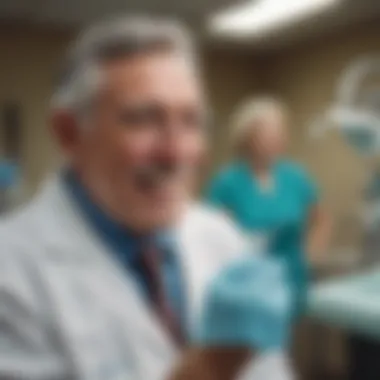Free Dental Care for Seniors: Your Essential Guide


Intro
Accessing dental care is vital, particularly for seniors over the age of 65. Yet, many individuals in this demographic encounter financial barriers that prevent them from obtaining essential services. This guide aims to illuminate the avenues available for free dental treatment specifically aimed at seniors, helping them navigate government programs and local initiatives tailored to their needs.
Seniors often feel overwhelmed by the complexity of health services. As they age, oral health becomes increasingly critical, yet many may lack the financial resources to pay for dental treatments. By understanding the options available to them, seniors can make informed decisions, ensuring they receive the necessary care without undue financial strain.
Overview of Free Dental Treatment
Definition of Free Dental Treatment
Free dental treatment can encompass a variety of services, including preventive care, restorative procedures, and emergency services. These are typically provided at little or no cost to eligible seniors. Various government policies and nonprofit organizations actively offer assistance, aiming to reduce barriers to dental care.
Importance of the Program for Seniors
For seniors, maintaining good oral health is crucial, not just for overall well-being but also for social engagement and self-esteem. Poor dental health can lead to complications such as difficulty eating, social withdrawal, and increased risk of other health issues. Free dental treatment programs play a critical role in ensuring that seniors can access necessary services that contribute to their quality of life.
Types of Available Options
Seniors may find different types of free dental treatment options, such as:
- Government-sponsored programs: Various national and state programs provide free or subsidized dental care.
- Community clinics: Local health departments and nonprofit organizations may offer free dental days or ongoing services.
- University dental schools: Many dental institutions provide discounted care while offering educational opportunities to students.
- Charitable initiatives: Organizations like the Dental Lifeline Network work specifically to connect seniors with needed services.
Overall, familiarity with available options is essential for seniors striving to maintain their oral health without financial burden. In the next section, we will delve into a detailed analysis of these programs to further clarify how to access these services.
The Importance of Dental Health for Seniors
Dental health is a critical component of overall wellness, particularly for seniors. As individuals age, they often encounter unique challenges regarding oral health. This demographic must prioritize their dental needs to maintain both physical health and quality of life.
Impact of Oral Health on Overall Well-being
The connection between oral health and overall well-being cannot be overstated. Poor oral hygiene can lead to various health problems, including diabetes, heart disease, and respiratory issues. These conditions often exacerbate existing health concerns in seniors, complicating their management and treatment.
Furthermore, oral health affects nutritional intake. Many seniors face difficulty eating due to dental pain or missing teeth. This issue can result in inadequate nutrition, which in turn can affect immune function and overall vitality. Moreover, oral health impacts self-esteem; painful or unattractive dental issues can lead to social withdrawal and depression. Thus, maintaining good oral health is essential for holistic well-being in older adults.
Common Dental Issues Faced by Seniors
Seniors encounter a variety of dental problems more frequently than younger adults. Here are some of the most common issues:
- Gum Disease: This is one of the most pervasive issues faced by seniors. Gum disease can lead to tooth loss and has been associated with serious health conditions.
- Tooth Decay: Despite common misconceptions that tooth decay only affects younger populations, seniors also suffer from this condition, particularly due to medications that reduce saliva flow.
- Dry Mouth: Many medications can cause dry mouth, leading to discomfort and increased risk of decay and gum disease.
- Tooth Sensitivity: Some seniors experience heightened sensitivity, which can make eating and drinking uncomfortable.
Eligibility for Free Dental Treatment
Eligibility for free dental treatment is critical for seniors who face both financial and health challenges. This section explores essential criteria that govern access to dental care, emphasizing why understanding these components is imperative. The benefits of knowing one's eligibility can substantially improve seniors' access to essential services that support their overall health. Furthermore, being informed about these aspects can help individuals navigate various programs available to them.
Age Requirements
Most programs offering free dental treatment have specific age requirements. Generally, seniors are considered to be individuals aged 65 and over. Some programs may begin at 60 or even 55 depending on their specific guidelines. The age criterion is significant because it often correlates with increased dental needs due to age-related conditions. By having programs tailored for this demographic, the aim is to address oral health concerns that emerge as one ages. Seniors should verify the exact age requirement of the program they are interested in to ensure they qualify.
Income Considerations
Income plays a major role in determining eligibility for free dental treatment. Many programs are designed to assist those with low income. The definition of 'low income' can vary from one program to another, but it typically aligns with federal poverty guidelines. For seniors, fixed incomes from pensions or social security can limit their financial freedom. Therefore, understanding individual income level relative to these guidelines is essential.


- Documentation: Seniors may be required to provide proof of income, such as tax returns or social security statements.
- Asset Limits: Some programs also consider assets, like savings, when evaluating eligibility.
By recognizing these income considerations, seniors can assess their eligibility and make better financial decisions.
Citizenship and Residency Guidelines
Most government and some non-governmental programs have citizenship and residency stipulations that determine access to free dental care. Generally, individuals must be U.S. citizens or legal residents to qualify for these public assistance programs. This helps ensure that the available resources are directed to those who have the legal right to receive them.
Seniors need to be aware that residency requirements may include having lived in a specific state or locality for a designated period. Such guidelines might seem strict, but they aim to target the support where it is most needed within the community. For seniors who may not meet these criteria, researching other options like community clinics or charitable organizations can provide alternatives for obtaining necessary dental care.
Understanding eligibility is key. With awareness, seniors can navigate various programs and access vital dental services.
Government Programs Offering Free Dental Care
Government programs play a crucial role in providing dental care for seniors. Many elderly individuals face financial constraints that make it hard to afford dental services. These programs are designed to alleviate some of these burdens, ensuring that seniors can maintain their oral health, which is vital for overall well-being. Understanding these government initiatives can empower seniors to navigate their options more effectively.
Medicaid Coverage for Seniors
Medicaid is a significant program that provides dental coverage for eligible low-income seniors. Each state has its own rules regarding dental benefits, but in general, Medicaid offers comprehensive dental services including preventive care and necessary treatments. This can include exams, cleanings, fillings, and sometimes even dentures.
Certain states may limit the types of treatment available. Seniors should check with their state’s Medicaid office to understand what services are covered. Utilizing this coverage can help seniors preserve their teeth and maintain healthy gums. It also reduces the risk of serious health conditions linked to poor oral hygiene, such as heart disease and diabetes.
Medicare Dental Benefits Limitations
Medicare, while essential for many healthcare needs, has limitations when it comes to dental care. Generally, it does not provide dental coverage for routine or preventive services. This can be a significant hurdle for seniors seeking dental treatment because typical procedures like cleanings and preventive exams fall outside its scope.
However, there are exceptions. Medicare may cover dental services deemed necessary for medical procedures, such as tooth extractions before surgery. Seniors need to understand these limitations clearly. Exploring other options, like supplemental dental insurance or state programs, can be beneficial if they require more comprehensive care.
State-Specific Dental Programs
Some states have developed specific dental programs aimed at assisting seniors. These programs often provide resources tailored to local communities. For instance, states like California and New York have implemented initiatives to offer free or low-cost dental services to eligible seniors through community health centers.
Participation in these state-specific programs can vary widely. Details such as age requirements, income thresholds, and types of services offered depend largely on state regulations. Seniors should explore their state's health department website or contact local community organizations for more information.
Understanding the variety of available programs and their requirements can significantly impact a senior's access to necessary dental care.
Non-Governmental Options
Non-governmental options are vital in enhancing access to dental care for seniors. These programs and services often fill gaps that public systems may leave. They provide essential care for those who may not qualify for government assistance or require services not covered by those programs. By exploring these alternatives, seniors have a better chance to maintain their oral health, an aspect critical to overall well-being.
Community Dental Clinics
Community dental clinics serve as a cornerstone for accessible dental care. Many of these clinics operate on a sliding fee scale, which means they adjust costs based on income. This flexibility is particularly important for seniors, many of whom live on fixed incomes. The range of services offered at these clinics can include routine check-ups, cleanings, fillings, and even some oral surgeries. Seniors can receive care in a more comfortable environment, often surrounded by professionals who understand their specific needs and concerns.
In addition to affordability, community dental clinics often focus on outreach and education around dental health. This proactive approach can empower seniors to take charge of their oral hygiene. For those in need, many clinics also provide transportation assistance, ensuring seniors can access care easily.
Dental Schools and Programs
Dental schools are another excellent non-governmental resource for seniors. These institutions offer dental treatment at reduced prices because students perform the procedures under the supervision of licensed dentists. This setup provides a dual advantage: it allows seniors to receive care at a lower cost while helping to train the next generation of dental professionals. Services typically offered include general dentistry, preventive care, and sometimes, specialty services.
While the treatment at dental schools can take longer than at private practices, the attention and monitoring are often thorough. Seniors should be patient but can benefit considerably from this option. Moreover, visiting a dental school can promote enhanced educational initiatives, as students frequently engage in discussions about oral health with their patients.


Charitable Organizations Providing Aid
Charitable organizations play a crucial role in offering free or low-cost dental services to seniors. Groups like the Dental Lifeline Network provide care through volunteer dentists who donate their time and skills to help those in need. They often focus on underprivileged seniors who may be unaware of available services. Additionally, local charities or religious organizations may offer outreach programs aimed at connecting seniors with needed resources.
Seniors looking for assistance from these organizations can benefit from various programs that may not be widely publicized. Awareness of such resources tends to be limited. Therefore, community centers or senior organizations may provide valuable information about these offerings. It can also be helpful to look for campaigns or events that provide free dental days, which many charities organize regularly.
Below are some key points to remember when considering non-governmental options for dental treatment:
- Assess eligibility based on income or other criteria.
- Research local clinics, schools, and charities for available services.
- Be open to waiting longer for treatment in educational settings.
- Stay informed about community outreach initiatives that focus on senior health.
These resources play an important role in bridging the gap for seniors needing dental care. By exploring non-governmental options, seniors can access essential treatments to maintain their dental health.
Exploring the Application Process
Understanding the application process for free dental treatment is crucial for seniors seeking assistance. This process can often seem daunting, yet by breaking it down into manageable steps, seniors can gain clearer insight into how to navigate the system effectively. The benefits of comprehending this process include reduced stress, a higher likelihood of success in obtaining care, and empowerment in making informed decisions regarding oral health.
Understanding Documentation Requirements
Seniors must gather specific documents to apply for free dental treatment. These documents can vary based on the program or initiative being pursued. Commonly required items include:
- Proof of identity: A government-issued ID, like a driver's license or passport.
- Age verification: Documentation confirming that the applicant is over 65, such as a birth certificate.
- Income verification: Recent tax returns, pay stubs, or Social Security statements are often required to demonstrate financial need.
- Residency proof: This might include utility bills or lease agreements displaying the applicant's current address.
Organizing these documents ahead of time simplifies the application process. It is advisable to keep both physical and digital copies for reference.
Steps to Access Free Treatment
Once the necessary documentation is prepared, seniors can follow specific steps to access free dental treatment. These steps may include:
- Research Available Programs: Start by investigating local and national programs that offer dental care for seniors. Websites of organizations like Medicaid or state health departments provide useful information.
- Contact Dental Providers: Reach out to community dental clinics or dental schools to inquire about their programs for seniors. Many institutions have outreach programs specifically designed for those in need.
- Submit Applications: Fill out required applications for chosen programs accurately. Ensure all documentation is attached to avoid delays in processing.
- Follow Up: After submissions, it is essential to check back with the dental office or program administrator to confirm that the application is being processed and to ask if any further information is needed.
- Attend Appointments: Once approved, seniors should attend scheduled appointments or followup visits for evaluation and treatment.
Adhering to these steps increases the likelihood of receiving timely and necessary dental care.
Accessing free dental treatment can significantly enhance quality of life for seniors, helping maintain oral health and overall well-being.
Limitations and Challenges
When considering free dental treatment for seniors, it is crucial to understand the limitations and challenges inherent in these programs. These factors can significantly impact the effectiveness and accessibility of care for older adults. While many initiatives aim to provide support, awareness of their constraints can help seniors navigate the options more thoughtfully.
Availability of Services
The availability of services presents a notable challenge for seniors seeking dental care. Not all areas offer comprehensive resources, and this can vary significantly by region. In some rural locations, clinics might not be available at all, making access to care nearly impossible. Conversely, urban areas may have more providers, but the demand could also lead to long wait times.
- Factors influencing availability include:
- Proximity: Residents in remote areas may need to travel considerable distances.
- Provider Limits: Availability of local dentists willing to accept government programs can be few.
- Funding Variations: Government funding and state resources impact how many clinics can operate.
As a result, seniors often face obstacles in finding the necessary services. Awareness of local options and outreach programs is essential for overcoming these barriers.
Quality of Care Concerns
Quality of care is another significant concern in the realm of free dental treatment for seniors. While many clinics strive to provide quality services, not all are able to maintain high standards. Differences in training, equipment, and overall resources can affect outcomes.


Seniors might encounter:
- Inexperienced Staff: Some facilities, particularly dental schools, may have students offering care under supervision, which may not be ideal for everyone.
- Limited Treatment Options: Free services may focus on essential care and not provide extensive treatment options.
- Time Constraints: Busy clinics often have limited time per patient, impacting thoroughness.
The quality of dental care can greatly affect the overall health of seniors. It is vital to ensure that careful consideration is given when selecting a provider.
To support better outcomes, seniors should inquire about the qualifications of providers, patient reviews, and the types of treatments offered. This will help them make informed decisions regarding their dental healthcare. Ultimately, understanding these limitations and challenges will prepare seniors to navigate the landscape of free dental treatment more effectively.
Awareness and Education Initiatives
Awareness and education about free dental treatment options for seniors are crucial for improving access to necessary oral health services. Many elderly individuals may not realize that such programs exist or how to navigate the complexities of eligibility and application processes. Raising awareness helps demystify available resources, bridging the gap between seniors and their dental health needs.
Effective awareness initiatives can significantly change how seniors perceive dental care availability. When elderly individuals understand their options, they feel empowered to seek treatment. Education about free dental treatment can lead to increased usage rates of these programs, ultimately improving oral health outcomes among this demographic.
Moreover, educational efforts can also help correct prevalent misconceptions about the quality and accessibility of dental care for seniors. Many seniors might believe that dental treatment is only for those who can afford it, which isn’t entirely true. By providing accurate information, education initiatives can shine light on free community services, government programs, and other resources designed to assist those in need.
Community Outreach Programs
Community outreach programs play a vital role in informing seniors about available dental care options. These programs often collaborate with local organizations to provide targeted information sessions, workshops, and resource distribution events. By working directly within communities, these initiatives can reach vulnerable populations more effectively.
Such programs may offer:
- Informational seminars: These sessions can cover everything from basic dental care tips to the specific details of free treatment options.
- Health fairs: Many local health fairs feature dental screenings and general information about dental health, which can spur further conversation about free treatment services.
- Collaboration with healthcare providers: Healthcare workers are often the first point of contact for seniors. Training these providers to recognize signs of dental health issues and informing them about available dental support can lead to better referrals and increased access.
Community outreach programs do not only support education but also foster a sense of connection among seniors. Increased interaction with peers and health professionals can reduce feelings of isolation and encourage proactive health behaviors.
Accessing Informative Resources
In this digital age, accessing informative resources online has become essential for spreading awareness about free dental treatment options. Seniors must be equipped with the right tools to help them navigate the complex landscape of available services.
Several resources can facilitate informed decision-making:
- Government websites: Websites like Medicaid and Medicare provide detailed guidelines on eligibility and available benefits, making it easier for seniors to understand their rights.
- Non-profit organizations: Groups focused on dental health often publish comprehensive guides, brochures, and pamphlet that can be distributed in community centers or libraries.
- Social media platforms: Engaging with local Facebook groups or Reddit communities can provide valuable firsthand information from peers who have successfully accessed free dental services.
Informative materials should be designed with clarity in mind, using simple language and actionable steps. It is also key that these resources are made available in various formats, considering the needs of seniors with different literacy and comprehension levels.
It is vital to ensure that seniors are aware of their rights to free dental treatment options, fostering a proactive approach to health care and encouraging them to seek out available resources.
The End
Understanding the options for dental care and the availability of free dental treatment is vital for seniors. As individuals age, maintaining oral health becomes more challenging, often complicated by financial constraints. Access to free dental services ensures that older adults do not neglect their dental needs due to cost concerns.
Moreover, recognizing the eligibility requirements for various programs can simplify the decision-making process. Seniors deserve quality dental care that enhances their overall health and well-being. By leveraging resources such as Medicaid and local community clinics, one can obtain necessary treatments without incurring significant expenses.
Educating oneself about these options is not only beneficial but necessary. A well-informed individual can navigate the complexities of insurance coverage and government programs more effectively. This knowledge empowers seniors and their families to seek solutions tailored to their unique situations.
Ultimately, free dental treatment for seniors is about ensuring dignity and access to essential health care as they navigate this stage of life.
It is crucial to stay updated on new initiatives and community outreach programs that may arise. Changes in healthcare policies can impact existing resources. Therefore, continuously educating oneself on available options is critical.
Final Thoughts on Free Dental Treatment for Seniors
As the guide concludes, one must reflect on the profound implications of free dental treatment for seniors. Oral health directly influences overall health, and neglecting it can lead to severe consequences. The good news is that numerous avenues exist for obtaining free or low-cost dental care.
First, consider the programs already in place at the state level. Many states have specific programs tailored to the needs of elderly residents. Further, non-governmental options like community dental clinics often provide a menu of services intended for those who are often overlooked by standard healthcare systems.
Furthermore, various charitable organizations dedicated to supporting seniors can also offer essential aid. Engaging with these organizations can open doors to resources that promote both preventive care and treatment options.
To conclude, it is essential for seniors to be proactive about their dental health. Investing time in understanding available options will lead to better health outcomes. Taking action now can bring lasting benefits in oral health and general life quality in the years to come.















